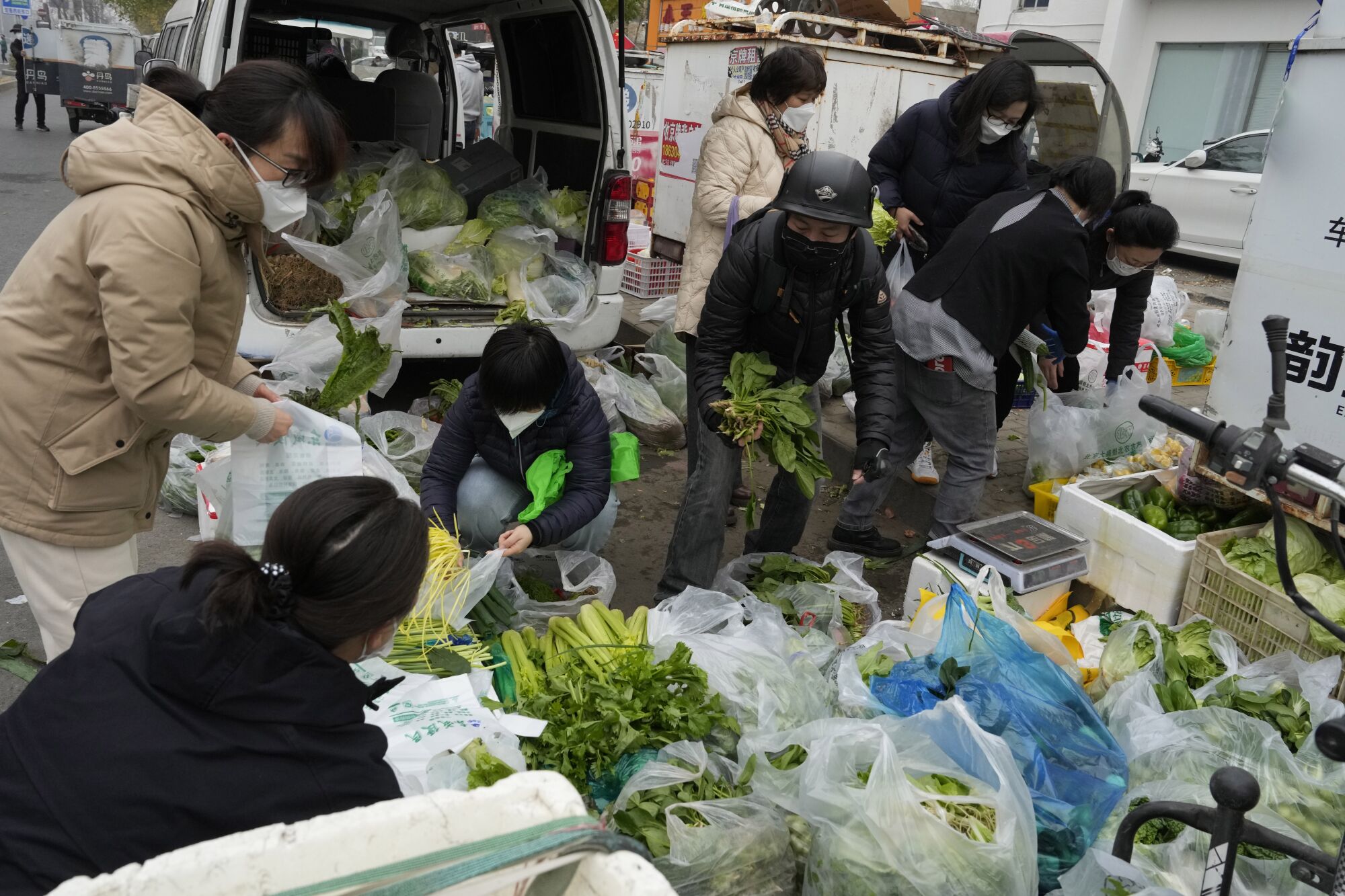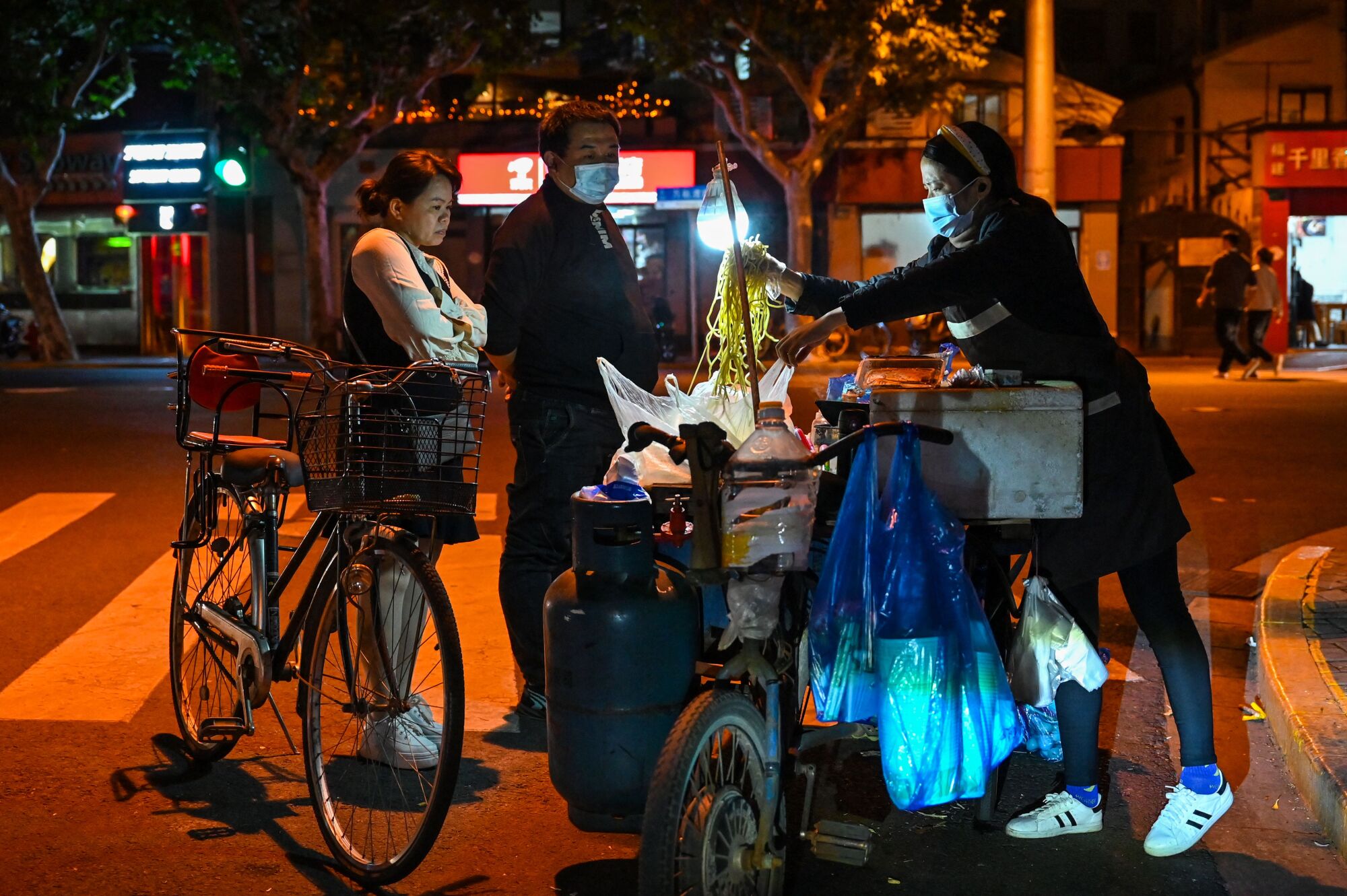Business
Braised frogs, mashed potatoes and barbecue: Can food stalls help save China’s economy?

As a child, Li Lejie went to work with his parents, acting as a lookout as they sold steamed buns on the street.
His job was to shout a warning if he spotted the chengguan, or urban management officers, who could fine them or confiscate their supplies for hawking food by the side of the road. His mother often told him he had to attend college someday, so he could become a businessman like his uncle.
Last summer, Li graduated from a university in Chengdu, in western China, with an internship in online tutoring and an opportunity for a promotion. But to his parents’ dismay, he quit to start his own street stall instead.
“I just wanted to try it, see what it was like,” the 23-year-old said. “And I had some quibbles with work.”
After 10 months of interning, Li was fed up with his supervisor and frustrated that his promotion would be probationary, without a raise for several weeks. Underwhelmed by other job openings in Chengdu, he moved to Guangzhou, on the southern coast, in August to join a high school friend selling braised snacks to passersby.
As China’s economic growth falters and young workers vie for dwindling jobs, many are embracing a humble occupation they might have once considered beneath them: street vending. Local governments that once treated it as a public nuisance have encouraged the trend, relaxing regulations in the hopes that more markets and food kiosks will boost spending and employment.
The paradigm shift is a sign of the deep wounds that the pandemic, along with tight government controls, have left on the world’s second-largest economy.
Chinese officials have begun encouraging street vending as a way to boost economic growth.
(Getty Images)
In June 2020, then-Premier Li Keqiang advocated for the “street stall economy” as a way to offset the financial pain caused by the country’s harsh COVID-19 restrictions. At that time, the idea of turning to food stalls to jump-start growth was widely panned and soon abandoned. But after three years of China’s unyielding “zero-COVID” pandemic policy, which stymied travel, spending and industrial output, authorities are turning to every possible option to bolster economic activity.
“We all thought that with the end of zero-COVID, we would get an explosion in consumption,” said Michael Pettis, professor of finance at Peking University’s Guanghua School of Management. “We’re still waiting for that to happen.”
While consumer spending picked up after coronavirus prevention measures were repealed in late December, the rebound has since tapered because of declining confidence in the country’s financial health amid a housing downturn, a slack labor market and high levels of government and household debt.
In May, youth unemployment reached a high of 20.8%, ahead of a record 11.6 million more college graduates entering the workforce this summer. A regulatory crackdown on private enterprise has hurt sectors that traditionally hired graduates, such as technology, education and real estate.
The dire situation has forced the government to swallow its traditional disdain for street stalls, long considered a plague on cleanliness and order in Chinese cities. Earlier this year, Beijing and Shanghai loosened rules to allow pop-up sellers to operate in more public areas. Other major cities, including Hangzhou and Shenzhen, have followed suit.
In Guangzhou, the capital of Guangdong province, street food is also back on the menu, though the chengguan tasked with supervising vendors still keep a zealous eye out for rule-breakers. Even so, Li spends much less time running from them than he did as a boy.
“If they come, they just stay to the side, maybe take a picture and wait a while,” Li said. “Now they’re all softer than before. It is a big change.”

A street vendor cooks food to sell on a quiet street in Beijing.
(Kevin Frayer / Getty Images)
As prospects for career advancement have dimmed for young Chinese, some workers have begun to reevaluate how much they will sacrifice for ambition, trading in high-powered jobs for a better work-life balance, flexible hours and travel. The growing inclination to try out street vending has also been driven in part by social media, a source of new recipes as well as videos on how to get started.
When Hu Jia, a 23-year-old in Chengdu, began posting video diaries of her new food cart on China’s Instagram-like app Xiaohongshu, other users started messaging her for advice on how to resign from their jobs and run their own stalls.
“They probably feel that the work they put in is not proportional to what they get back,” Hu said. “They could get pressure from their boss, their salary is low, they’re exhausted, so they think that going to work for themselves, whatever else it is, is at least freeing.”
Hu had been dissatisfied with her monthly salary of 5,000 yuan, or about $700, working in e-commerce with little opportunity to advance at the company. When her boyfriend made her a tasty mashed potato dish that he’d seen online, Hu thought it might be worth trying to sell.
Within three days, they had recouped their initial investment of 900 yuan, or about $125, she said. The couple has also started teaching others how to launch their own street-side businesses, for a fee.
“A street stall is a relatively low-cost thing to start up,” Hu said. “Plus, we aren’t working right now. If we had failed, we still would have been fine.”
Part of the unemployment crisis is due to a mismatch in available jobs and the high expectations of educated workers. The shortage of desirable positions for today’s college graduates, who came of age during China’s boom times, has sparked discussion over the younger generation’s willingness to accept other types of work. In a flippant twist on street vending, some graduates have set up stands to sell their academic knowledge, such as political science or psychology consulting.
Online, many have compared themselves to Kong Yiji, a figure from Chinese literature who wears a scholar’s robes but lives in poverty because he refuses to take a position beneath his education level. “Higher education is not just a stepping stone, but a pedestal I can’t come down from, more so is the long gown that Kong Yiji can’t take off,” one viral social media post declared earlier this year.

Residents buy fresh vegetables from street vendors in Beijing.
(Ng Han Guan / Associated Press)
In response, Chinese state media have encouraged young people not to hold on to such “shackles of the heart” and have frequently warned against tangping, or “lying flat,” a popular term for giving up in the face of burnout and “involution,” or diminishing economic returns.
Zhang Miao, a 28-year-old in Suzhou, west of Shanghai, decided to “take off his long gown” a year ago, when he shuttered his e-commerce business as online shopping slowed and started selling skewers of barbecued meat instead. His family had a hard time accepting his decision.
“They think what I’m doing is not as good as the industry I was in before,” he said. “They worry that my income has decreased, and the older generation, my grandparents, probably think that it’s shameful.”
As his kiosk has become more profitable, Zhang said, his parents have grown more supportive. He’s since overcome his initial fear of embarrassment about selling food on the street, but still considers it too undignified to cry out his wares.
“Although Kong Yiji’s long gown has come off, the undergarments are still there,” he said.
As some local street markets have flourished, Chinese media have been quick to tout success stories.
In May, the little-known industrial city of Zibo in Shandong province became an unexpected sensation on Douyin, or Chinese TikTok, drawing millions of visitors to its lively barbecue stalls. Government workers from other parts of China toured Zibo to glean inspiration, and the city’s mayor spoke at a May forum where new Chinese Premier Li Qiang emphasized the need to create more consumer hot spots.
But even with more young people on board, street vending is unlikely to be a panacea for China’s economic troubles.
“It’s just a short-term, temporary solution to the unemployment challenge,” said Zhang Yifan, a professor of economics at the Chinese University of Hong Kong. “For long-term growth, China still needs to rely on something else.”

Customers buy noodles from a street vendor in Shanghai.
(Hector Retamal / AFP via Getty Images)
Government officials have adopted various measures to improve employment rates, including mandates for state-owned companies to increase headcount. Guangdong province announced a proposal to place 300,000 graduates in jobs in rural villages, while Henan province unveiled a 100-day plan to provide unemployed graduates with guidance and training.
Economists say that without significantly increasing people’s income, it will be difficult to boost consumption enough to wean China off the infrastructure investments the government has relied on to keep the economy growing. In June, the central bank unexpectedly cut interest rates in an effort to stimulate borrowing and increase spending.
And as street stalls have become more popular, it’s already getting harder to make money.
“I thought by opening a stall I could escape the involution of looking for work,” one vendor wrote on Xiaohongshu. “It turns out I just took up another kind of involution.”
According to young merchants, space rental fees have increased, while every day more stalls pop up offering cheaper prices. Many describe the work as tiring, and recommend against quitting a well-paid job or taking up street vending as a full-time occupation.
“The competition is huge,” said Wu Yuanyuan, 23, a pharmaceuticals trainee who started selling desserts out of her car trunk on weekends to make extra cash. “One day you set up a stall; the next day there’s probably two or three more vendors in that same spot.”
Li, the Guangzhou vendor, said it took months to fine-tune his product and determine the location with the best foot traffic. He and his high school classmate tried selling braised duck wings first, but the preparation took hours and the profit margins were thin.
Braised bullfrogs were another experiment, but they needed to be bought fresh, which meant Li and his friend had to eat the unsold ones themselves — he estimated they each ate as many as four a day.
They finally settled on grilled fish, paying another street vendor 6,000 yuan, or about $840, to teach them how to make it. After five days of test-cooking 30 fish, with the help of a chef friend to adjust the recipe, they started selling in October.
“Everyone says opening a street stall is liberating — since you’re working for yourself, you can rest when you want to,” Li said. “But when you do it, you realize once it starts going well, you can’t bear to stop and rest.”

Business
On TikTok, Users Thumb Their Noses at Looming Ban

Over the last week, the videos started appearing on TikTok from users across the United States.
They all made fun of the same thing: how the app’s ties to China made it a national security threat. Many implied that their TikTok accounts had each been assigned an agent of the Chinese government to spy on them through the app — and that the users would miss their personal spies.
“May we meet again in another life,” one user wrote in a video goodbye set to Whitney Houston’s cover of Dolly Parton’s “I Will Always Love You.” The video included an A.I.-generated image of a Chinese military officer.
The videos were just one way that some of TikTok’s 170 million monthly U.S. users were reacting as they prepared for the app to disappear from the country as soon as Sunday.
The Supreme Court is set to rule on a federal law that required TikTok’s Chinese owner, ByteDance, to sell the app by Jan. 19 or face a ban in the United States. U.S. officials have said China could use TikTok to harvest Americans’ private data and spread covert disinformation. TikTok, which has said a sale is impossible and challenged the law, is now awaiting the Supreme Court’s response.
The possibility that the justices will uphold the law has set off a palpable sense of grief and dark humor across the app. Some users have posted videos suggesting ways to circumvent a ban with technological workarounds. Others have downloaded another Chinese app, Xiaohongshu, also known as “Red Note,” to thumb their noses at the U.S. government’s concerns about TikTok’s ties to China.
The videos highlight the collision taking place online between the law, which Congress passed with wide support last year, and everyday users of TikTok, who are dismayed that the app may soon disappear.
“Much of my TikTok feed now is TikTokers ridiculing the U.S. government, TikTokers thanking their Chinese spy as a form of ridicule,” said Anupam Chander, a professor of law and technology at Georgetown University and an expert on the global regulation of new technologies. “TikTokers recognize that they are not likely to be manipulated by anyone. They are actually quite sophisticated about the information they’re receiving.”
TikTok declined to comment on the users’ references to its ties to China.
Some users are not willing to give up the app — or their supposed spies — so easily.
Hundreds of TikTok videos over the last week have cataloged how teenagers could keep using the app in the United States, according to a review by The New York Times. One of the most popular methods described is the use of a VPN, or a virtual private network, which can mask a user’s location and make it appear that the person is elsewhere.
“They can’t actually ban TikTok in the U.S. because VPNs are not banned,” Sasha Casey, a TikTok user, said in a recent video that was liked over 60,000 times. “Use a VPN. And send a picture to Congress while you do it, because that’s what I’ll be doing.”
While VPNs can make it appear that a phone, a laptop or another electronic device is in a remote location, it is not clear if the technology can circumvent the ban. A device’s real location is stored in many places, including in the app store that was used to download TikTok.
TikTok fans also seem to be behind the sudden surge in popularity for Xiaohongshu, the most downloaded free app on Tuesday and Wednesday in the U.S. Apple Store. Hundreds of millions of people in China use the app, which, like TikTok, features short videos and text-based posts. Xiaohongshu means “little red book” in Mandarin.
Mr. Chander anticipates that the Supreme Court will uphold the ban law this week, though he believes that TikTok has the winning case. He said the downloads of Red Note and the Chinese spy memes showed that many Americans did not agree with their government’s security concerns, particularly at the expense of free speech.
“When the United States shutters a massive free expression service, which our democratic allies have not shuttered, it will make us the censor and put us in the unusual position of silencing expression,” Mr. Chander said. “It will make Americans who use TikTok really distrustful of the U.S. government as carrying their best interests.”
Business
Edison stock turns volatile as growing blame for wildfires lands on the power company

Southern California’s catastrophic fires have rocked the stock of Edison International, the parent company of Southern California Edison, as accusations and lawsuits about the utility’s potential role in starting the fires mount.
Shares of Edison International closed up 5% at $61.30 on Wednesday after plunging 23% this month, making it one of the worst performers on the Standard & Poor’s 500. The rebound came after Ladenburg Thalmann analysts upgraded their rating of the stock to neutral from sell, saying that their target price of $56.50 a share reflected worst-case outcomes associated with the current wildfires.
“At this time, it is too early to discern what the outcomes will be with respect to the impact of the fires on the California Wildfire Insurance Fund solvency and/or the future earnings of Edison International,” the analysts wrote, according to Barron’s. “An initial assessment of SCE’s role in the start of the fires will likely not occur until the summer of 2025 at the earliest.”
State lawmakers established the wildfire fund in the wake of wildfires several years ago after Wall Street investors lost confidence and ratings agencies threatened to downgrade California’s investor-owned utilities.
Market analyst Zacks downgraded Edison International stock from outperform to neutral after the fires started last week. Zacks predicted Edison’s operating revenue would increase during 2025 and 2026, while acknowledging that “the company has been incurring significant wildfire-related costs” and that “higher-than-expected decommissioning costs could materially impact the company’s operating results.”
RBC Capital Markets, another analyst, had a loftier view of Edison as recently as October when it called the utility “a high quality operator, with investor confidence around wildfire risk improving from best in class mitigation efforts.”
The fallout from the fires is an abrupt disruption for a company that had been surging in recent months. In its most recent quarterly report, the company posted a profit of $516 million, or $1.33 per share, compared with $155 million, or 40 cent per share, in the third quarter of last year.
“Our team has achieved remarkable success over the last several years managing unprecedented climate challenges, making our operations more resilient and positioning us strongly for the growth ahead,” President Pedro J. Pizarro said in the report.
Fire agencies are investigating whether downed Southern California Edison utility equipment played a role in igniting the 800-acre Hurst fire near Sylmar, company officials have acknowledged.
The company issued a report Friday saying that a downed conductor was discovered at a tower in the vicinity of the Hurst fire, but that it “does not know whether the damage observed occurred before or after the start of the fire.” The fire is nearly fully contained, according to the California Department of Forestry and Fire Protection.
SCE is also under scrutiny for possibly being involved in sparking the Eaton fire that has burned 14,000 acres and destroyed thousands of structures, wiping out whole swaths of Altadena, where at least 16 people died in the blaze.
On Tuesday the Newport Beach law firm of Bridgford, Gleason & Artinian filed a mass action complaint in Los Angeles Superior Court against SCE regarding the Eaton fire on behalf of victims including Jeremy Gursey, whose Altadena property was destroyed in the fire.
“Based upon our investigation, our discussions with various consultants, the public statements of SCE, and the video evidence of the fire’s origin, we believe that the Eaton Fire was ignited because of SCE’s failure to de-energize its overhead wires which traverse Eaton Canyon—despite a red flag PDS wind warning issued by the national weather service the day before the ignition of the fire,” lawyer Richard Bridgford said in a statement.
The firm said it has represented more than 10,000 California fire victims in past suits against Pacific Gas & Electric Co. and SCE. Bridgford told Yahoo Finance that his inbox is full of Southern California residents seeking to participate in the Eaton fire lawsuit and that he anticipates “there’ll be hundreds joining.”
The most extreme level of a red flag fire warning, a “particularly dangerous situation,” returned to parts of Los Angeles and Ventura counties Wednesday morning, heightening concerns about the potential for new fires.
“The danger has not yet passed,” Los Angeles Fire Department Chief Kristin Crowley said during a news conference Wednesday. “So please prioritize your safety.”
Business
Albania Gives Jared Kushner Hotel Project a Nod as Trump Returns

The government of Albania has given preliminary approval to a plan proposed by Jared Kushner, Donald J. Trump’s son-in-law, to build a $1.4 billion luxury hotel complex on a small abandoned military base off the coast of Albania.
The project is one of several involving Mr. Trump and his extended family that directly involve foreign government entities that will be moving ahead even while Mr. Trump will be in charge of foreign policy related to these same nations.
The approval by Albania’s Strategic Investment Committee — which is led by Prime Minister Edi Rama — gives Mr. Kushner and his business partners the right to move ahead with accelerated negotiations to build the luxury resort on a 111-acre section of the 2.2-square-mile island of Sazan that will be connected by ferry to the mainland.
Mr. Kushner and the Albanian government did not respond Wednesday to requests for comment. But when previously asked about this project, both have said that the evaluation is not being influenced by Mr. Kushner’s ties to Mr. Trump or any effort to try to seek favors from the U.S. government.
“The fact that such a renowned American entrepreneur shows his interest on investing in Albania makes us very proud and happy,” a spokesman for Mr. Rama said last year in a statement to The New York Times when asked about the projects.
Mr. Kushner’s Affinity Partners, a private equity company backed with about $4.6 billion in money mostly from Saudi Arabia and other Middle East sovereign wealth funds, is pursuing the Albania project along with Asher Abehsera, a real-estate executive that Mr. Kushner has previously teamed up with to build projects in Brooklyn, N.Y.
The Albanian government, according to an official document recently posted online, will now work with their American partners to clear the proposed hotel site of any potential buried munitions and to examine any other environmental or legal concerns that need to be resolved before the project can move ahead.
The document, dated Dec. 30, notes that the government “has the right to revoke the decision,” depending on the final project negotiations.
Mr. Kushner’s firm has said the plan is to build a five-star “eco-resort community” on the island by turning a “former military base into a vibrant international destination for hospitality and wellness.”
Ivanka Trump, Mr. Trump’s daughter, has said she is helping with the project as well. “We will execute on it,” she said about the project, during a podcast last year.
This project is just one of two major real-estate deals that Mr. Kushner is pursuing along with Mr. Abehsera that involve foreign governments.
Separately, the partnership received preliminary approval last year to build a luxury hotel complex in Belgrade, Serbia, in the former ministry of defense building, which has sat empty for decades after it was bombed by NATO in 1999 during a war there.
Serbia and Albania have foreign policy matters pending with the United States, as both countries seek continued U.S. support for their long-stalled efforts to join the European Union, and officials in Washington are trying to convince Serbia to tighten ties with the United States, instead of Russia.
Virginia Canter, who served as White House ethics lawyer during the Obama and Clinton administrations and also an ethics adviser to the International Monetary Fund, said even if there was no attempt to gain influence with Mr. Trump, any government deal involving his family creates that impression.
“It all looks like favoritism, like they are providing access to Kushner because they want to be on the good side of Trump,” Ms. Canter said, now with State Democracy Defenders Fund, a group that tracks federal government corruption and ethics issues.
-
/cdn.vox-cdn.com/uploads/chorus_asset/file/25822586/STK169_ZUCKERBERG_MAGA_STKS491_CVIRGINIA_A.jpg)
/cdn.vox-cdn.com/uploads/chorus_asset/file/25822586/STK169_ZUCKERBERG_MAGA_STKS491_CVIRGINIA_A.jpg) Technology1 week ago
Technology1 week agoMeta is highlighting a splintering global approach to online speech
-

 Science5 days ago
Science5 days agoMetro will offer free rides in L.A. through Sunday due to fires
-
/cdn.vox-cdn.com/uploads/chorus_asset/file/25821992/videoframe_720397.png)
/cdn.vox-cdn.com/uploads/chorus_asset/file/25821992/videoframe_720397.png) Technology1 week ago
Technology1 week agoLas Vegas police release ChatGPT logs from the suspect in the Cybertruck explosion
-

 Movie Reviews1 week ago
Movie Reviews1 week ago‘How to Make Millions Before Grandma Dies’ Review: Thai Oscar Entry Is a Disarmingly Sentimental Tear-Jerker
-

 Health1 week ago
Health1 week agoMichael J. Fox honored with Presidential Medal of Freedom for Parkinson’s research efforts
-

 Movie Reviews1 week ago
Movie Reviews1 week agoMovie Review: Millennials try to buy-in or opt-out of the “American Meltdown”
-

 News1 week ago
News1 week agoPhotos: Pacific Palisades Wildfire Engulfs Homes in an L.A. Neighborhood
-

 Business1 week ago
Business1 week agoMeta Drops Rules Protecting LGBTQ Community as Part of Content Moderation Overhaul














